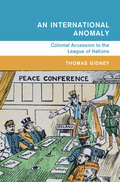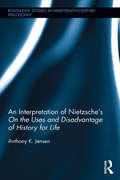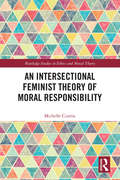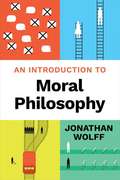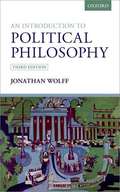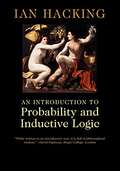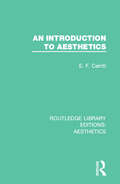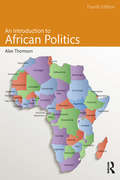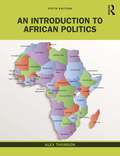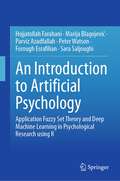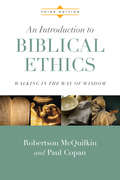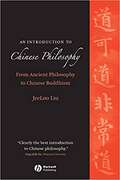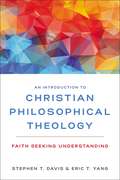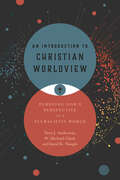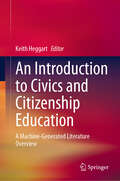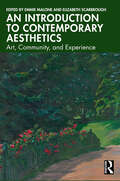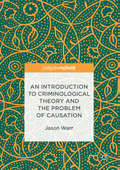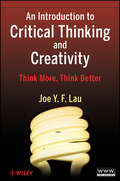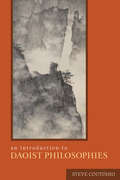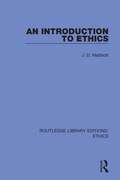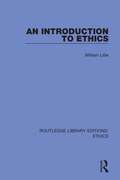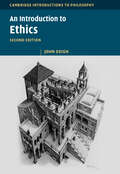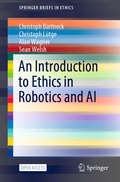- Table View
- List View
An International Anomaly: Colonial Accession to the League of Nations (Global and International History)
by Thomas GidneyIt is often assumed that only sovereign states can join the United Nations. But this was not always the case. At the founding of the United Nations, a loophole drafted by British statesmen in its predecessor organisation, the League of Nations, was carried forward, allowing colonies to accede as member-states. Colonies such as India, Ireland, Egypt, and many more were afforded a tokenistic representation at the League in Geneva during the interwar years, decades before their independence. Thomas Gidney unites three geographically distinct case studies to demonstrate the evolution of Britain's policy from a range of different viewpoints, exploring how this policy came into being, and why it was only exploited by the British Empire. He argues that this membership shaped colonial norms around sovereignty and international recognition in the interwar period and to the present day. This title is also available as open access on Cambridge Core.
An Interpretation of Nietzsche's On the Uses and Disadvantage of History for Life (Routledge Studies in Nineteenth-Century Philosophy)
by Anthony K. JensenWith his An Interpretation of Nietzsche’s "On the Uses and Disadvantage of History for Life", Anthony K. Jensen shows how 'timely' Nietzsche’s second "Untimely Meditation" really is. This comprehensive and insightful study contextualizes and analyzes a wide range of Nietzsche’s earlier thoughts about history: teleology, typology, psychology, memory, classical philology, Hegelianism, and the role historiography plays in modern culture. On the Uses and Disadvantage of History for Life is shown to be a ‘timely’ work, too, insofar as it weaves together a number of Nietzsche's most important influences and thematic directions at that time: ancient culture, science, epistemology, and the thought of Schopenhauer and Burckhardt. Rather than dismiss it as a mere ‘early’ work, Jensen shows how the text resonates in Nietzsche’s later perspectivism, his theory of subjectivity, and Eternal Recurrence. And by using careful philological analysis of the text’s composition history, Jensen is in position to fully elucidate and evaluate Nietzsche’s arguments in their proper contexts. As such Jensen’s Interpretation should restore Nietzsche’s second "Untimely Meditation" to a prominent place among 19th Century philosophies of history.
An Intersectional Feminist Theory of Moral Responsibility (Routledge Studies in Ethics and Moral Theory)
by Michelle CiurriaThis book develops an intersectional feminist approach to moral responsibility. It accomplisheses four main goals. First, it outlines a concise list of the main principles of intersectional feminism. Second, it uses these principles to critique prevailing philosophical theories of moral responsibility. Third, it offers an account of moral responsibility that is compatible with the ethos of intersectional feminism. And fourth, it uses intersectional feminist principles to critique culturally normative responsibility practices. This is the first book to provide an explicitly intersectional feminist approach to moral responsibility. After identifying the five principles central to intersectional feminism, the author demonstrates how influential theories of responsibility are incompatible with these principles. She argues that a normatively adequate theory of blame should not be preoccupied with the agency or traits of wrongdoers; it should instead underscore, and seek to ameliorate, oppression and adversity as experienced by the marginalized. Apt blame and praise, according to her intersectional feminist account, is both communicative and functionalist. The book concludes with an extensive discussion of culturally embedded responsibility practices, including asymmetrically structured conversations and gender- and racially biased social spaces. An Intersectional Feminist Approach to Moral Responsibility presents a sophisticated and original philosophical account of moral responsibility. It will be of interest to philosophers working at the crossroads of moral responsibility, feminist philosophy, critical race theory, queer theory, critical disability studies, and intersectionality theory.
An Introduction To Moral Philosophy
by Jonathan WolffRather than telling students what to think about moral issues, this NEW text teaches students how to think for themselves. Using real-world examples and vivid illustrations drawn from other disciplines, it challenges preconceived notions about morality and demonstrates why ethics matters. A companion volume, Readings in Moral Philosophy, provides primary selections that amplify issues discussed in the text and extends them to problems in applied ethics.
An Introduction To Political Philosophy
by Jonathan WolffA concise, lucid and thought-provoking introduction to the most important questions of political philosophy, organised around the major issues. Wolff provides the structure that beginners' need, whilst also introducing some distinctive ideas of his own.
An Introduction To Probability And Inductive Logic
by Ian HackingThis is an introductory textbook on probability and induction written by one of the world's foremost philosophers of science. The book has been designed to offer maximal accessibility to the widest range of students (not only those majoring in philosophy) and assumes no formal training in elementary symbolic logic.
An Introduction to Aesthetics (Routledge Library Editions: Aesthetics Ser. #1)
by E. F. CarrittThis book provides an introduction into the subject of aesthetics and the problems associated with it. It emphasizes that aesthetics is not strictly a criterion or rule for production or appreciation. The book will be of interest to students of both art and philosophy.
An Introduction to African Politics
by Alex ThomsonThe fourth edition of An Introduction to African Politics is an ideal textbook for those new to the study of this fascinating continent. It gets to the heart of the politics of this part of the world. How is modern Africa still influenced by its colonial past? How do strong ethnic and religious identities on the continent affect government? Why has the military been so influential? How does African democracy differ from democracy in the West? These are the sorts of question tackled by the book. The result is a textbook that identifies the essential features of African politics, allowing students to grasp the recurring political patterns that have dominated this continent since independence. Key features include: Thematically organised, with individual chapters exploring issues such as colonialism, ethnicity, nationalism, religion, social class, ideology, legitimacy, authority, sovereignty and democracy. Identifies key recurrent themes such as the competitive relationships between the African state, its civil society and external interests. Contains useful boxed case studies at the end of each chapter, including: Kenya, Tanzania, Nigeria, Botswana, Côte d'Ivoire, Uganda, Somalia, Ghana, Democratic Republic of the Congo and Zimbabwe. Each chapter concludes with key terms and definitions, as well as questions and advice on further reading. This textbook is essential reading for students seeking an accessible introduction to the complex social relationships and events that characterise the politics of post-colonial Africa.
An Introduction to African Politics
by Alex ThomsonThis fully updated fifth edition of An Introduction to African Politics is an ideal textbook for those new to the study of this fascinating continent. Charting trends in government over six decades of the post-colonial era, the book tackles key questions such as: How have African states made sense of their colonial inheritance? How relevant are ethnic and religious identities? Why have some states collapsed and others prospered? Why did the one-party state fail? Why is contemporary Africa now dominated by electoral authoritarian states, and not the multi-party democracies promised in the 1990s? Key features include: thematically organised, with chapters exploring issues such as colonialism, ethnicity, nationalism, religion, social class, ideology, legitimacy, authority, sovereignty and democracy; new five-part structure makes clearer Africa’s political evolution over time; new chapter on the emergence of ‘hybrid states’ and ‘electoral authoritarianism’; more coverage of twenty-first century governance trends such as China’s impact, the changing role of the military, different uses of ‘client–patron’ networks, Western conditionality and the ‘Africa rising’ debate; colour presentation of maps, photos and data; boxed case studies including Mali, Tanzania, Nigeria, Botswana, Côte d’Ivoire, Uganda, Somalia, Ghana, the Democratic Republic of the Congo, Tunisia and Angola; each chapter concludes with key terms and definitions, questions and further reading. An Introduction to African Politics is essential reading for students seeking an accessible introduction to the complex social relationships and events that characterise the politics of post-colonial Africa.
An Introduction to Artificial Psychology: Application Fuzzy Set Theory and Deep Machine Learning in Psychological Research using R
by Peter Watson Sara Saljoughi Hojjatollah Farahani Marija Blagojević Parviz Azadfallah Forough EsrafilianArtificial Psychology (AP) is a highly multidisciplinary field of study in psychology. AP tries to solve problems which occur when psychologists do research and need a robust analysis method. Conventional statistical approaches have deep rooted limitations. These approaches are excellent on paper but often fail to model the real world. Mind researchers have been trying to overcome this by simplifying the models being studied. This stance has not received much practical attention recently. Promoting and improving artificial intelligence helps mind researchers to find a holistic model of mental models. This development achieves this goal by using multiple perspectives and multiple data sets together with interactive, and realistic models. In this book, the methodology of approximate inference in psychological research from a theoretical and practical perspective has been considered. Quantitative variable-oriented methodology and qualitative case-oriented methods are both used to explain the set-oriented methodology and this book combines the precision of quantitative methods with information from qualitative methods. This is a book that many researchers can use to expand and deepen their psychological research and is a book which can be useful to postgraduate students. The reader does not need an in-depth knowledge of mathematics or statistics because statistical and mathematical intuitions are key here and they will be learned through practice. What is important is to understand and use the new application of the methods for finding new, dynamic and realistic interpretations. This book incorporates theoretical fuzzy inference and deep machine learning algorithms in practice. This is the kind of book that we wished we had had when we were students. This book covers at least some of the most important issues in mind research including uncertainty, fuzziness, continuity, complexity and high dimensionality which are inherent to mind data. These are elements of artificial psychology. This book implements models using R software.
An Introduction to Biblical Ethics: Walking in the Way of Wisdom
by Paul Copan Robertson McQuilkinWhat should we do or not do? What attitudes, behavior and qualities are good? Can we be good without God? What is the highest good, the purpose of human existence? These are the questions the study of ethics seeks to answer. Unlike many approaches to ethics, this book foundationally turns to Scripture, going only as far as Scripture itself goes. The result is an overview of biblical ethics that not only addresses the life of love and wisdom to be lived out by Christians as virtuous individuals, but also as Christians in community, in society and in a world of God?s creation. Key preliminary considerations of love, law, sin and virtue are given their due in this thoroughly revised and updated text. The bulk of the work is then organized around the Ten Commandments and ethical themes springing from them—loving God (commandments 1-4) and loving others (commandments 6-10). This new edition includes added material on ethical alternatives such as relativism, social contract, utilitarianism and evolutionary ethics the seven deadly sins as well as the cardinal virtues vs. theological virtues end-of-life ethics, stem-cell research, animal rights, sexuality, genetics and technology, and other bioethical issues such as plastic surgery and surrogate motherhood technology and its depersonalizing effects as well as helping the poor the church?s engagement in society and how Christians can make a difference in the media. McQuilkin and Copan stay focused on how we are fulfilling the purposes of God for our lives—a will that is for our good and our well-being. This comprehensive study is the place to begin on the journey of living wisely, faithfully and obediently.
An Introduction to Chinese Philosophy, 2nd Edition
by Karyn L. LaiThis comprehensive introductory textbook to early Chinese philosophy covers a range of philosophical traditions which arose during the Spring and Autumn (722–476 BCE) and Warring States (475–221 BCE) periods in China, including Confucianism, Mohism, Daoism, and Legalism. It considers concepts, themes and argumentative methods of early Chinese philosophy and follows the development of some ideas in subsequent periods, including the introduction of Buddhism into China. The book examines key issues and debates in early Chinese philosophy, cross-influences between its traditions and interpretations by scholars up to the present day. The discussion draws upon both primary texts and secondary sources, and there are suggestions for further reading. This will be an invaluable guide for all who are interested in the foundations of Chinese philosophy and its richness and continuing relevance.
An Introduction to Chinese Philosophy: From Ancient Philosophy to Chinese Buddhism
by JeeLoo LiuAn Introduction to Chinese Philosophy unlocks the mystery of ancient Chinese philosophy and unravels the complexity of Chinese Buddhism by placing them in the contemporary context of discourse. <P><P> Elucidates the central issues and debates in Chinese philosophy, its different schools of thought, and its major philosophers. Covers eight major philosophers in the ancient period, among them Confucius, Laozi, and Zhuangzi. Illuminates the links between different schools of philosophy. Opens the door to further study of the relationship between Chinese and Western philosophy.
An Introduction to Christian Philosophical Theology: Faith Seeking Understanding
by Stephen T. Davis Eric T. YangAn accessible introduction to Christian philosophical theologyPhilosophical or analytic theology seeks to employ philosophical tools while studying topics in Christian theology and examining the logical consistency or intelligibility of some of the key doctrines of the Christian faith. In this accessible primer, An Introduction to Christian Philosophical Theology, authors Stephen T. Davis and Eric T. Yang first explain the scope, relevance, and value of philosophical theology and then applies its conceptual tools to examine each of the core Christian doctrines:Revelation and ScriptureThe TrinityThe IncarnationRedemption and the atonement,Resurrection and life after deathThe final chapter briefly addresses some additional theological issues including petitionary prayer, eschatology, and original sin.Designed for beginning students and non-specialists this guide provides the ideal entry point for not only understanding what philosophical theology is but also for how it can provide valuable insights for how we think about the core doctrines of the Christian faith.
An Introduction to Christian Worldview: Pursuing God's Perspective in a Pluralistic World
by Tawa J. Anderson W. Michael Clark David K. NaugleAn Introduction to Christian WorldviewWhy do worldviews matter?What characterizes a Christian worldview?How can we analyze and describe a worldview? What are the most common secular and religious worldviews? An Introduction to Christian Worldview
An Introduction to Civics and Citizenship Education: A Machine-Generated Literature Overview
by Keith HeggartThis book serves as a starting point for pre-service teachers and researchers by providing a concise and thorough summary of key themes within the field of civics and citizenship education. The field of civics and citizenship education is both complex and contested in local and international jurisdictions. It is also a key site for political and policy interventions by governments and other interested parties. While this activity makes the field a vibrant one, it also means that it can be challenging for teachers and researchers to enter and understand the ongoing debates and discussions and the implications these present for their research and educational practice. The book begins with a detailed examination of the history of civics and citizenship education from a variety of perspectives and in different locations. It recognizes and documents how the place and importance of civics and citizenship education has changed over the last century and how this has been realized in various educational initiatives. It also examines the current state of educational and policy-level initiatives in civics and citizenship education, noting the differences between different state and country approaches. This book also undertakes a detailed consideration of the different typologies of civics and citizenship education that have been formulated by various researchers, including notions like justice-oriented citizenship, activist citizenship, and critical citizenship. It examines the theoretical foundations of both active citizenship education and global citizenship education and how these have been enacted in school settings. Furthermore, it examines the place of citizenship in higher education institutions and non-formal educational settings, including practices and statements about the importance of developing global citizenship in these arenas. It also presents a number of different case studies showcasing the variety of approaches to civics and citizenship education and discusses the opportunities and challenges educators and researchers face when researching and implementing it.
An Introduction to Contemporary Aesthetics: Art, Community, and Experience
by Emmie Malone Elizabeth ScarbroughAn Introduction to Contemporary Aesthetics: Art, Community, and Experience gives students and other readers a comprehensive sense of the dynamic issues and problems in aesthetics and philosophy of art today. Each of the 14 chapters is written by a different expert in the field, and together they cover a wide range of methodological approaches and perspectives, including those from analytic and Continental philosophy, non-Eurocentric global traditions, and critical stances taken up by feminist philosophers and philosophers of race. In addition, the volume makes use of recent empirical work on art and beauty as well as examples of artistic expressions from cultures from around the world. In contrast to other coursebooks, which are often structured entirely around artforms, this volume frames much of its contents around core aesthetic concepts—like good or bad taste, interpretation, or authenticity—with each chapter devoted to a different concept. Within each chapter, the reader will find a range of engaging artforms and experiences. The contents of the volume are laid out in four parts: the first focuses on foundational questions in aesthetics and the second on key aesthetic concepts. The third part focuses on applied questions relating to particular artforms and genres (e.g., horror, comedy, AI art, games). Finally, the last part of the volume takes a wider, but still practical, view, focusing on why aesthetic life matters to us, both as a society and as individuals.Key Features Written in a non-technical style for readers new to aesthetics and with little or no background in philosophy or the study of the arts Draws on examples readers encounter in everyday life and popular culture, from Drake to Philly cheesesteaks Deals with questions that concern many college students today: Does authenticity even matter and, if so, why? What’s wrong with enjoying the work of an immoral artist? How are our homes and schools important places of aesthetic meaning? Each chapter is written as a biased survey, with clear coverage of the historical and contemporary literature on the topic but also from a distinct, subjective point of view Non-Eurocentric philosophies or examples are included throughout the book, highlighting the rich and diverse philosophical work from around the globe Discussion Questions offer student readers opportunities to engage more fully with the problems raised in the text Suggestions for Further Reading at the end of each chapter identify the most promising avenues for further research on the topic
An Introduction to Criminological Theory and the Problem of Causation
by Jason WarrThis text offers a novel contribution to the literature on core criminological theory by introducing the complex issues relating to the structuring and analysing of causation. This text traces the paradigm shift, or drift, that has occurred in the history of criminology and shows how the problem of causation has been a leading factor in these theoretical developments. This short book is the first of its kind and is an introductory text designed to introduce both seasoned criminologists as well as students of criminology to the interesting intersections between the fields of criminology and the philosophy of the social sciences. The problem of causation is notoriously difficult and has plagued philosophers and scientists for centuries. Warr highlights the importance of grappling with this problem and demonstrates how it can lead to unsuccessful theorising and can prevent students from fully appreciating the development of thinking in criminology. This accessible account will prove to be a must-read for scholars of criminal justice, penology and philosophy of social science.
An Introduction to Critical Thinking and Creativity
by Joe Y. F. LauA valuable guide on creativity and critical thinking to improve reasoning and decision-making skills Critical thinking skills are essential in virtually any field of study or practice where individuals need to communicate ideas, make decisions, and analyze and solve problems. An Introduction to Critical Thinking and Creativity: Think More, Think Better outlines the necessary tools for readers to become critical as well as creative thinkers. By gaining a practical and solid foundation in the basic principles that underlie critical thinking and creativity, readers will become equipped to think in a more systematic, logical, and imaginative manner. Creativity is needed to generate new ideas to solve problems, and critical thinking evaluates and improves an idea. These concepts are uniquely introduced as a unified whole due to their dependence on each other. Each chapter introduces relevant theories in conjunction with real-life examples and findings from cognitive science and psychology to illustrate how the theories can be applied in numerous fields and careers. An emphasis on how theoretical principles of reasoning can be practical and useful in everyday life is featured, and special sections on presentation techniques, the analysis of meaning, decision-making, and reasoning about personal and moral values are also highlighted. All chapters conclude with a set of exercises, and detailed solutions are provided at the end of the book. A companion website features online tutorials that further explore topics including meaning analysis, argument analysis, logic, statistics, and strategic thinking, along with additional exercises and multimedia resources for continued study. An Introduction to Critical Thinking and Creativity is an excellent book for courses on critical thinking and logic at the undergraduate and graduate levels. The book also serves as a self-contained study guide for readers interested in the topics of critical thinking and creativity as a unified whole.
An Introduction to Daoist Philosophies
by Steve CoutinhoSteve Coutinho explores in detail the fundamental concepts of Daoist thought as represented in three early texts: the Laozi, the Zhuangzi, and the Liezi. Readers interested in philosophy yet unfamiliar with Daoism will gain a comprehensive understanding of these works from this analysis, and readers fascinated by ancient China who also wish to grasp its philosophical foundations will appreciate the clarity and depth of Coutinho's explanations.Coutinho writes a volume for all readers, whether or not they have a background in philosophy or Chinese studies. A work of comparative philosophy, this volume also integrates the concepts and methods of contemporary philosophical discourse into a discussion of early Chinese thought. The resulting dialogue relates ancient Chinese thought to contemporary philosophical issues and uses modern Western ideas and approaches to throw new interpretive light on classical texts. Rather than function as historical curiosities, these works act as living philosophies in conversation with contemporary thought and experience. Coutinho respects the multiplicity of Daoist philosophies while also revealing a distinctive philosophical sensibility, and he provides clear explanations of these complex texts without resorting to oversimplification.
An Introduction to Description Logic
by Franz Baader Ian Horrocks Carsten Lutz Uli SattlerDescription logics (DLs) have a long tradition in computer science and knowledge representation, being designed so that domain knowledge can be described and so that computers can reason about this knowledge. DLs have recently gained increased importance since they form the logical basis of widely used ontology languages, in particular the web ontology language OWL. Written by four renowned experts, this is the first textbook on description logics. It is suitable for self-study by graduates and as the basis for a university course. Starting from a basic DL, the book introduces the reader to their syntax, semantics, reasoning problems and model theory and discusses the computational complexity of these reasoning problems and algorithms to solve them. It then explores a variety of reasoning techniques, knowledge-based applications and tools and it describes the relationship between DLs and OWL.
An Introduction to Ethics
by J. D. MabbottOriginally published in 1966, this introduction to moral philosophy examines the philosophical basis of moral problems and considers some of the crucial arguments that attempt to define or dispense with a moral justification of events. Some of the questions discussed are whether moral rules are justified and whether there is any positive evidence that man has free will.
An Introduction to Ethics
by William LillieOriginally published in 1948, and reprinted in 1955 and updated in 1961, this book is a straightforward account of moral philosophy for students. It discusses comprehensively the contributions made by 20th Century moralists, both in terms of the interpretation of their predecessors and original ethical speculation.
An Introduction to Ethics (Cambridge Introductions to Philosophy)
by John DeighNow in an expanded and revised second edition, this book offers clear, penetrating examination of the central questions of ethics through study of the most important ethical theories in Western philosophy. Readers are introduced not only to the main ideas of each theory but also to contemporary developments and defenses of those ideas. Among theories the book covers are egoism, the eudaimonism of Plato and Aristotle, act and rule utilitarianism, modern natural law theory, Kant's moral theory, and existentialist ethics. Two new chapters add to this coverage expositions of Hume's ethics, Sidgwick's program for defending utilitarianism, and Rawls's hypothetical contractarianism. The discussions throughout draw the reader into philosophical inquiry through argument and criticism that illuminate the profundity of the questions under examination. Students will find this book to be a helpful guide to how philosophical inquiry is undertaken as well as to what the major theories of ethics hold.
An Introduction to Ethics in Robotics and AI (SpringerBriefs in Ethics)
by Alan Wagner Christoph Lütge Sean Welsh Christoph BartneckThis open access book introduces the reader to the foundations of AI and ethics. It discusses issues of trust, responsibility, liability, privacy and risk. It focuses on the interaction between people and the AI systems and Robotics they use. Designed to be accessible for a broad audience, reading this book does not require prerequisite technical, legal or philosophical expertise. Throughout, the authors use examples to illustrate the issues at hand and conclude the book with a discussion on the application areas of AI and Robotics, in particular autonomous vehicles, automatic weapon systems and biased algorithms. A list of questions and further readings is also included for students willing to explore the topic further.
